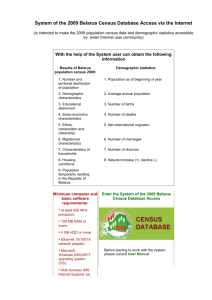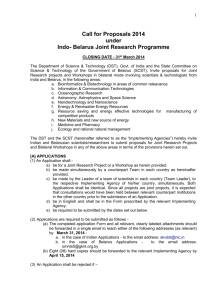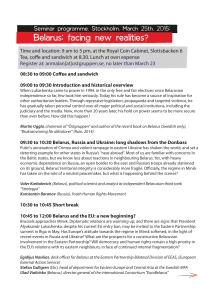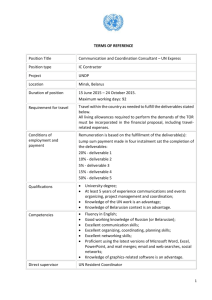Challenge 7 – ICT for enterprises and production/PPP Factories of
advertisement
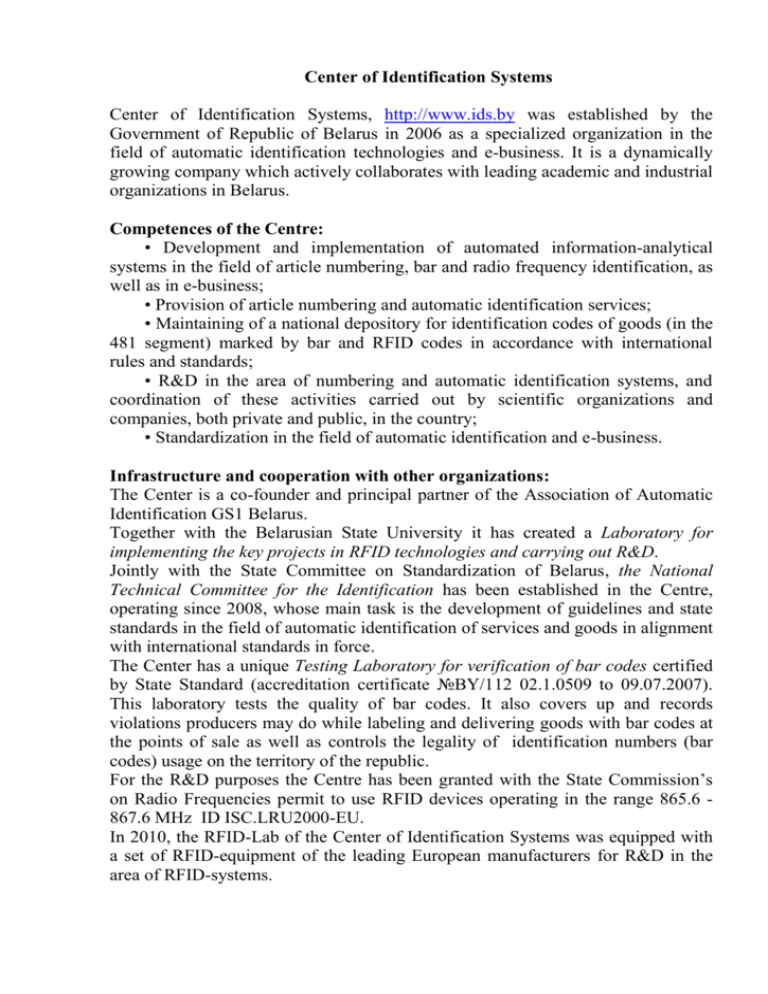
Center of Identification Systems Center of Identification Systems, http://www.ids.by was established by the Government of Republic of Belarus in 2006 as a specialized organization in the field of automatic identification technologies and e-business. It is a dynamically growing company which actively collaborates with leading academic and industrial organizations in Belarus. Competences of the Centre: • Development and implementation of automated information-analytical systems in the field of article numbering, bar and radio frequency identification, as well as in e-business; • Provision of article numbering and automatic identification services; • Maintaining of a national depository for identification codes of goods (in the 481 segment) marked by bar and RFID codes in accordance with international rules and standards; • R&D in the area of numbering and automatic identification systems, and coordination of these activities carried out by scientific organizations and companies, both private and public, in the country; • Standardization in the field of automatic identification and e-business. Infrastructure and cooperation with other organizations: The Center is a co-founder and principal partner of the Association of Automatic Identification GS1 Belarus. Together with the Belarusian State University it has created a Laboratory for implementing the key projects in RFID technologies and carrying out R&D. Jointly with the State Committee on Standardization of Belarus, the National Technical Committee for the Identification has been established in the Centre, operating since 2008, whose main task is the development of guidelines and state standards in the field of automatic identification of services and goods in alignment with international standards in force. The Center has a unique Testing Laboratory for verification of bar codes certified by State Standard (accreditation certificate №BY/112 02.1.0509 to 09.07.2007). This laboratory tests the quality of bar codes. It also covers up and records violations producers may do while labeling and delivering goods with bar codes at the points of sale as well as controls the legality of identification numbers (bar codes) usage on the territory of the republic. For the R&D purposes the Centre has been granted with the State Commission’s on Radio Frequencies permit to use RFID devices operating in the range 865.6 867.6 MHz ID ISC.LRU2000-EU. In 2010, the RFID-Lab of the Center of Identification Systems was equipped with a set of RFID-equipment of the leading European manufacturers for R&D in the area of RFID-systems. 2 The Center provides services in the field of automatic identification for more than 3000 legal entities in Belarus. The major national customers of the Centre’s projects: • Ministry of Foreign Affairs of the Republic of Belarus and its representative offices in other countries, • Ministry of Trade of Belarus, • Ministry of Agriculture and Food of Belarus, • Department of State Signs, Ministry of Finance of the Republic of Belarus, • National Academy of Sciences of Belarus, • Association for Automatic Identification GS1 Belarus, etc. Areas of R&D activities: • Developing of automated information systems for automatic identification of article numbering and automatic identification systems, including systems for Internet of things; • Establishment of e-commerce and electronic workflow. The Centre is currently implementing a national project which is aimed at developing of a data bank of electronic passports of goods. Content and testing mechanism used by the project, as well as its approaches were discussed and approved by the 15th session of Committee on Trade Facilitation and Electronic Business Economic Commission for Europe (UN / CEFACT, Geneva, November, 2009), and also at the Regional Preparatory Meeting of CIS for the World Telecommunication Development Conference (Minsk, November, 2009), organized by the International Telecommunication Union. Research potential and international cooperation: Actually, the Center has founded in Belarus a new R&D area - automatic identification technologies. Currently, its staff is 67 empl., incl. 47 researchers of which 21 are under the age of 35. There are published scientific articles and reports at international conferences on topics related to the Centre’s works. Within the framework of European initiative ISTOK-SOYUZ in 2009, the Centre has won the competition and received logistical support from the Organizing Committee (until 2012) in searching for partners and preparing participation in FP7 projects. The Centre is actively working on self-promotion for establishing international cooperation with the leading European companies in the area of RFID. Possible areas of cooperation within the ERA-WIDE project: • Preparation of analytical reports and scientific studies, market assessment of automatic identification technologies in Belarus, Russia, Kazakhstan, Ukraine and Baltic region with participation of the leading international experts; 3 • Working out a strategy for development of the Centre of Identification Systems based on the best European practices in the field of automatic identification technologies; • Development of registries and databases synchronized with the European registers (products depository registered in GS1, synchronization with international classifiers and so on) as well as the development of national guidelines for the simplification of trade procedures in accordance with international requirements and standards; • Joining European network of laboratories and EPC-RFID-labs for collaborative researches; • Share-knowledge and training facilities at the leading European research organizations; • Supporting research in the Internet of things area, and other areas relevant to the Centre’s competence with the participation of the leading European research institutions; • Training of young researchers in Belarusian universities with the involvement of European experts, as well as organization of training of young researchers in European universities and leading scientific organizations; • Promotion of RFID-technology in the territory of Belarus, Russia, Kazakhstan, Ukraine and Baltic countries, as well as the promotion of competences of the Center itself; • Organization of conferences in Belarus as well as participation in the European conferences, seminars and international exhibitions together with the European institutions interested; • Preparation of joint proposals for FP7 and other EU/EU MS-funded international programs in the areas mentioned below. Areas of interest within ICT Work Programme 2011-2012: Challenge 1– Pervasive and Trusted Network and Service Infrastructures Objective 1.3 focuses on architectures and systems for the interconnection of sensors, actuators and embedded computational and intelligent elements connected to the Internet and other relevant networks. These architectures provide a consistent integration and interoperability framework for the massively heterogeneous environments that have appeared so far through developments framed by vertical sectors. They will offer the identification, self-configuration, self-healing and autonomic properties needed for appropriate reliability, privacy, security, realtime response and governance of these 'smart environments, whilst making possible business scenarios based on dynamic access to "smart" resources. Objective 1.2 - software, services and cloud computing technologies will focus on technologies specific to the networked distributed dimension of software and the distributed access to services and data. This includes support for mobility, massive scalability, verification and validation of software-based services, self-management etc. Cloud computing technologies such as virtualized infrastructures and energy efficiency issues, platform management aspects like data consistency and protection, and inter-cloud-operability are included as well. As such, this objective is complemented by work on service-oriented architectures, service discovery and composition that is now addressed under the Future Internet PPP. 4 Challenge 7 – ICT for enterprises and production/PPP Factories of Future Objective 7.1 Smart Factories: Agile manufacturing and customisation covers novel process automation, systems and tools for an integrated control and optimisation of factory assets. It also addresses intelligent cooperative robotic systems and their programming to support flexible, small batch and craft manufacturing as well as novel lasers and laser-based material processing systems. It finally covers new metrology tools and methods for managing large-scale manufacturing information in real-time. Objective 7.2 Manufacturing solutions for new ICT products will contribute to establish the bases for, and demonstrate the feasibility of, low-cost, high volume and high throughput manufacturing processes for Organic Large Area Electronics (OLAEs) and Organic Photonics. Research will focus on the main manufacturing roadblocks such as patterning technologies, improvement of material parameters, process stability and control, and architectures to cut production costs, and will include quality control, testing and validation elements. Standardisation issues will also be addressed. Objective 7.3 Virtual factories and enterprises will support collaborative and adaptive virtual enterprise environments based on increased business intelligence and enriched knowledge and asset management tools. They should allow for distributed and global supply chains, production, logistics, product lifecycle management as well as sales and after sales operations. These tools should support innovation across the value chain and enable new business models leveraging integrated product/service systems. Objective 7.4 Digital factories: Manufacturing design & product lifecycle management will address the development of interoperable solutions for complex systems manufacturing by bringing together under a common objective disparate European competence in digital manufacturing (modelling, simulation, visualisation, etc). Research work will address the early stages of manufacturing through computer-assisted prototyping and testing to reduce the need for physical prototyping and testing. The focus will be on advanced engineering platforms that enable information sharing of product-relevant knowledge across different players of the value chain, on simulation tools and programming tools for massive parallelisation of industrial codes and on interoperable models and virtual prototyping and testing environments enabling the use of various aspects of design and engineering. Contacts: Victor Dravitsa, Director Phone: +375 17 2949080 e-mail: info@ids.by Alexander Reshetnyak, Head of International Projects Department e-mail: rav@ids.by 15/2 Akademicheskaya str., 220072 Minsk http://www.ids.by
